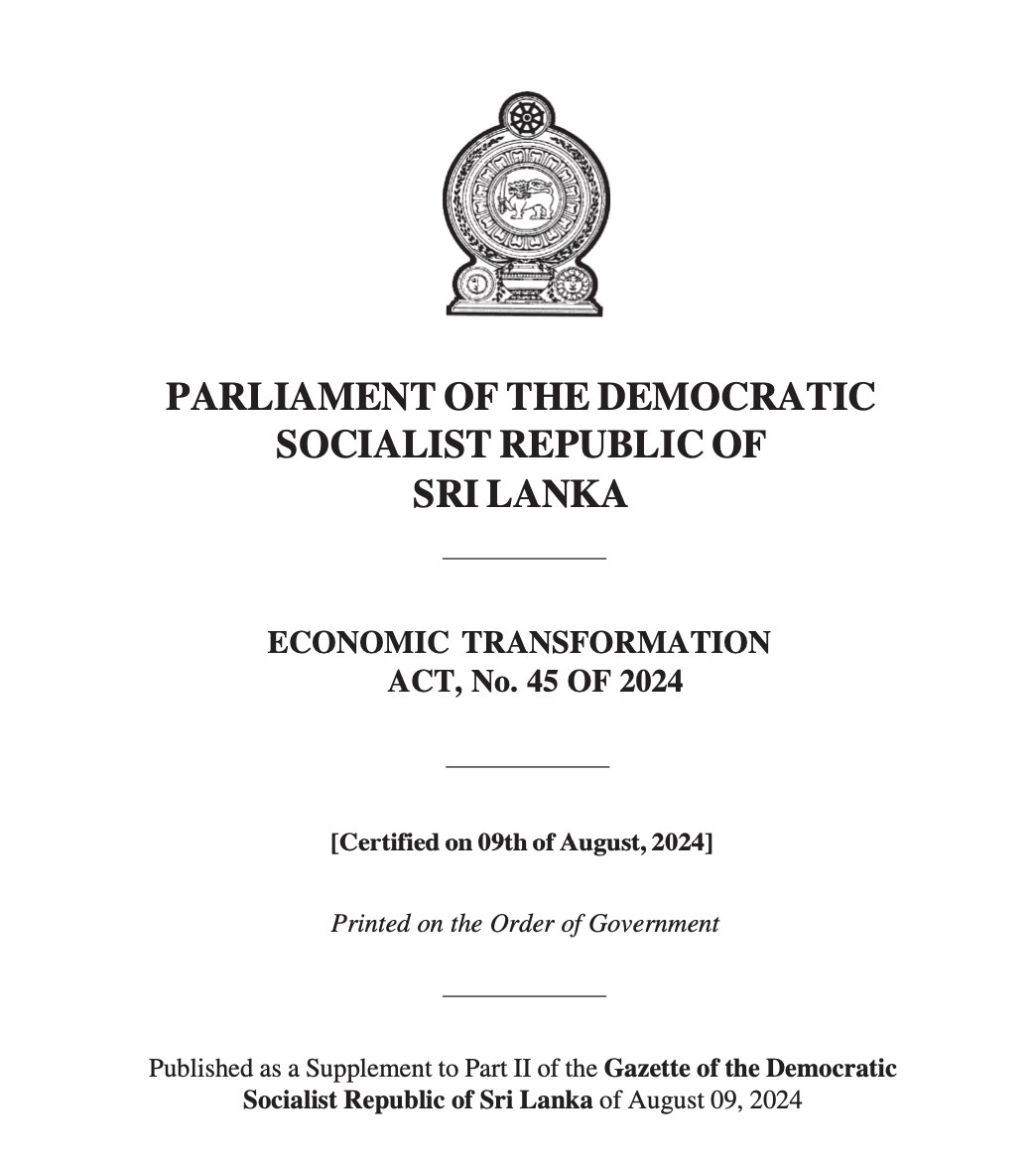The Economic Transformation Act, No. 45 of 2024, outlines Sri Lanka’s national strategy for economic growth, investment attraction, and global trade integration. This Act addresses challenges in the evolving global economy, establishing new institutions and policies for a robust, competitive economy. Key elements include:
- National Policy on Economic Transformation: This policy targets sustainable economic development through public and private sector initiatives, aiming to boost citizens’ living standards, reduce poverty, and maintain stable economic growth. Specific targets include a debt-to-GDP ratio under 95% by 2032, an annual GDP growth rate of at least 5% by 2027, and a female labor force participation rate of 50% by 2040.
- Creation of Key Economic Agencies: The Act establishes several specialized bodies:
- Economic Commission of Sri Lanka: The primary agency for promoting investment, facilitating business, and overseeing strategic projects.
- Investment Zones (Zones SL): Designated areas with incentives and infrastructure for sectors like technology, agriculture, and tourism, encouraging foreign direct investment (FDI).
- Office for International Trade and National Productivity Commission: These agencies manage trade policies, promote export competitiveness, and drive productivity improvements.
- Sri Lanka Institute of Economics and International Trade: An educational body to enhance trade and economic knowledge in Sri Lanka.
- Investment Promotion and Facilitation: The Act emphasizes transforming Sri Lanka into an investor-friendly nation by removing barriers to investment and providing incentives. The Economic Commission can designate certain investments as strategically important and provide regulatory and procedural support for these investments.
- Fiscal and Monetary Goals: The Act sets financial targets, including a primary budget surplus of 2% of GDP by 2032, government revenue goals exceeding 15% of GDP beyond 2027, and a cap on the current account deficit to less than 1% of GDP. These targets aim to foster fiscal discipline and prevent future crises.
- Investment Guarantees and Dispute Resolution: To protect foreign investors, the Act provides assurances against expropriation without compensation and guarantees fair treatment, allowing investors recourse to Sri Lankan courts or international arbitration in case of disputes. Investment Zones offer additional protections, treating investments within these zones as external to local customs and tax jurisdictions for streamlined operations.
- Trade and Export-Driven Growth: The Act encourages export diversification and aims to raise exports to 60% of GDP by 2040. It facilitates trade agreement negotiations and promotes outward-oriented growth through sector-specific support within the investment zones.
- Environmental and Social Goals: To ensure sustainable growth, the Act includes commitments to achieving net-zero greenhouse gas emissions by 2050 and modernizing agriculture to increase productivity and incomes. It also mandates measures for poverty reduction, aiming to lower the multi-dimensional poverty rate to 10% by 2035.
- Transparency and Accountability: All government policies, regulations, and activities must align with the National Policy on Economic Transformation, and an annual report on progress is to be presented to Parliament. The Act empowers the Economic Commission to manage an annual review of key metrics and mandates corrective action for unmet targets, reinforcing government accountability.
- Administrative Structure and Oversight: The Act details the organization and roles within the Economic Commission, including the Director General, EC Board, and advisory committees. Members are selected based on expertise in fields like economics, law, and finance, with measures to prevent conflicts of interest. Parliament maintains oversight, ensuring the agencies operate transparently and effectively.
- Incentives and Exemptions: The Act allows the Economic Commission to propose tax and other regulatory incentives to attract strategic investments, with exemptions available for activities that align with national economic goals.














